Abstract
This study was conducted to identify the factors perceived by African-American men as influencing their behavior relative to prostate cancer screening. A total of 49 African-American men, age 40 and above, participated in 10 focus group discussions in Florida. Data collection was between October 12, 2001 and March 9, 2002 in Tallahassee, Tampa, and Miami. Data analysis was conducted using a comprehensive ethnographical analysis, including the use of an ethnographical retrieval program, Nonnumerical Unstructured Data Indexing Searching and Theorizing (QSR NUD*IST 4.0) software. Factors identified as influencing prostate cancer screening participation by African-American men were impediments to prostate cancer screening; positive outcome beliefs associated with prostate cancer screening; social influence; negative outcome beliefs associated with prostate cancer screening; resources or opportunities that facilitate prostate cancer screening; prostate cancer knowledge; perceived susceptibility to prostate cancer; perceived threat of prostate cancer; perceived severity of prostate cancer; positive health activities; illness experience; and prostate cancer screening intervention message concept, message source, and message channel. The results of this study may offer an excellent guide to designing effective, culturally sensitive, and relevant interventions, which would increase African-American men's participation in prostate cancer screening.
Full text
PDF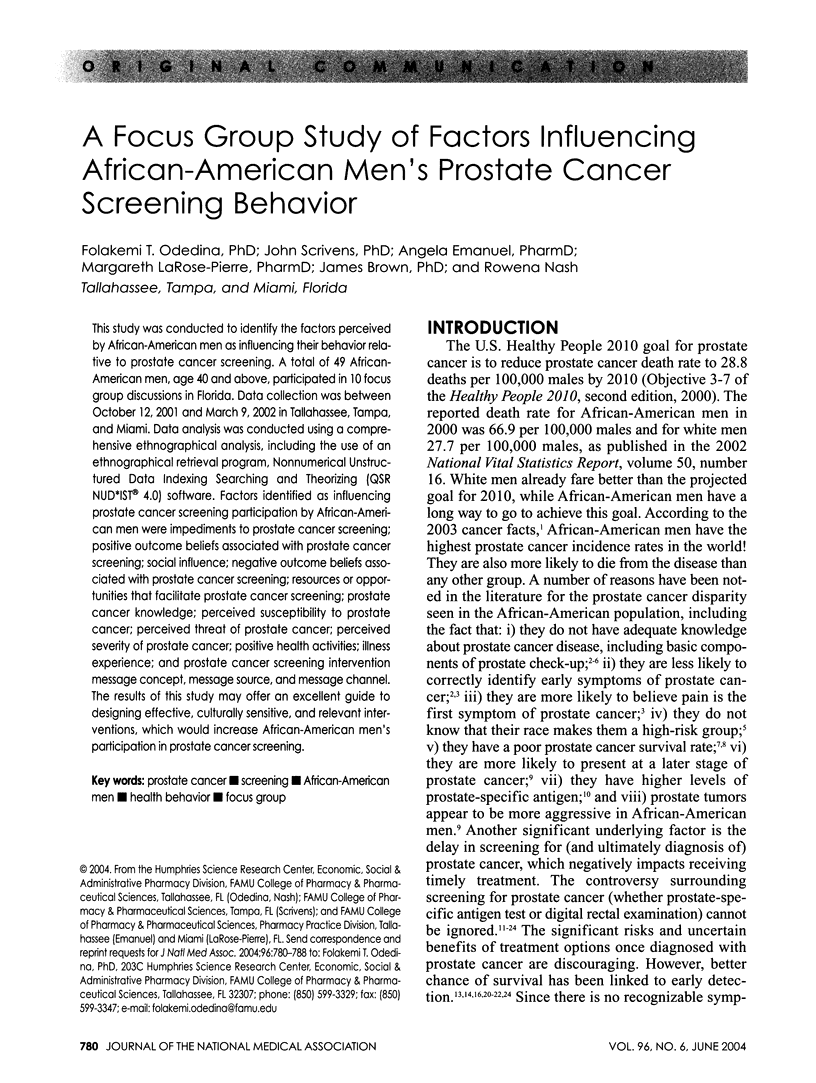
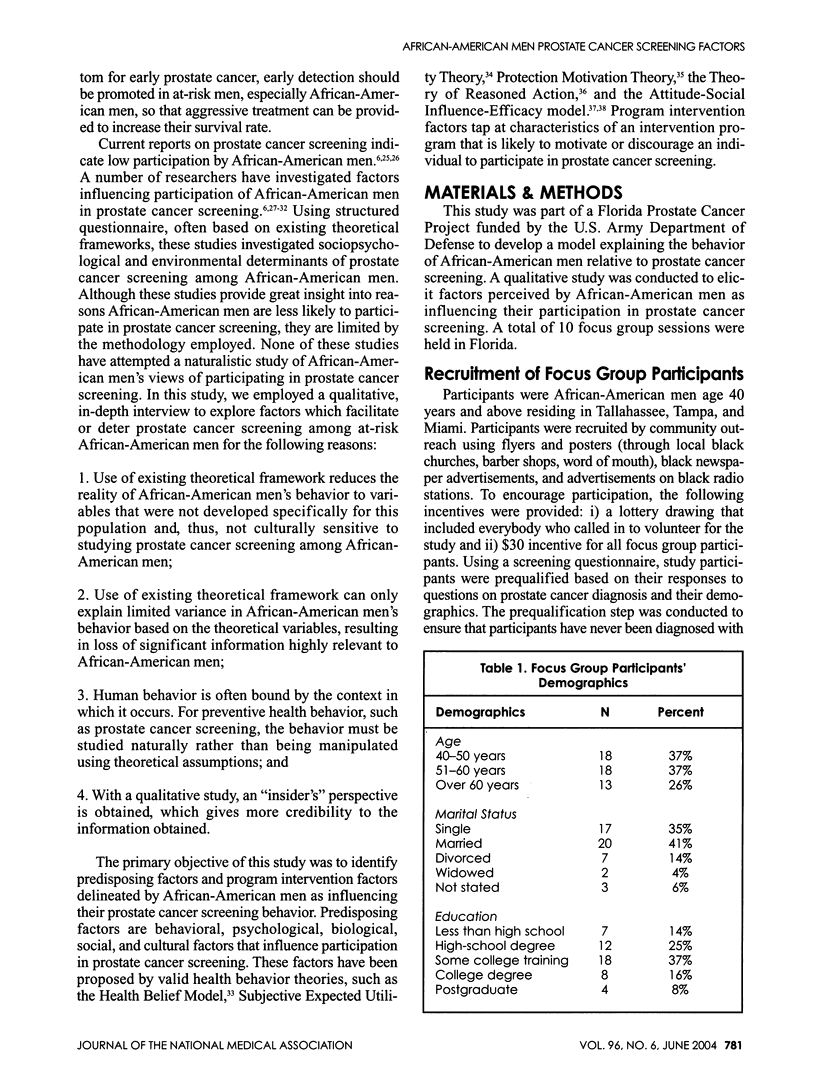
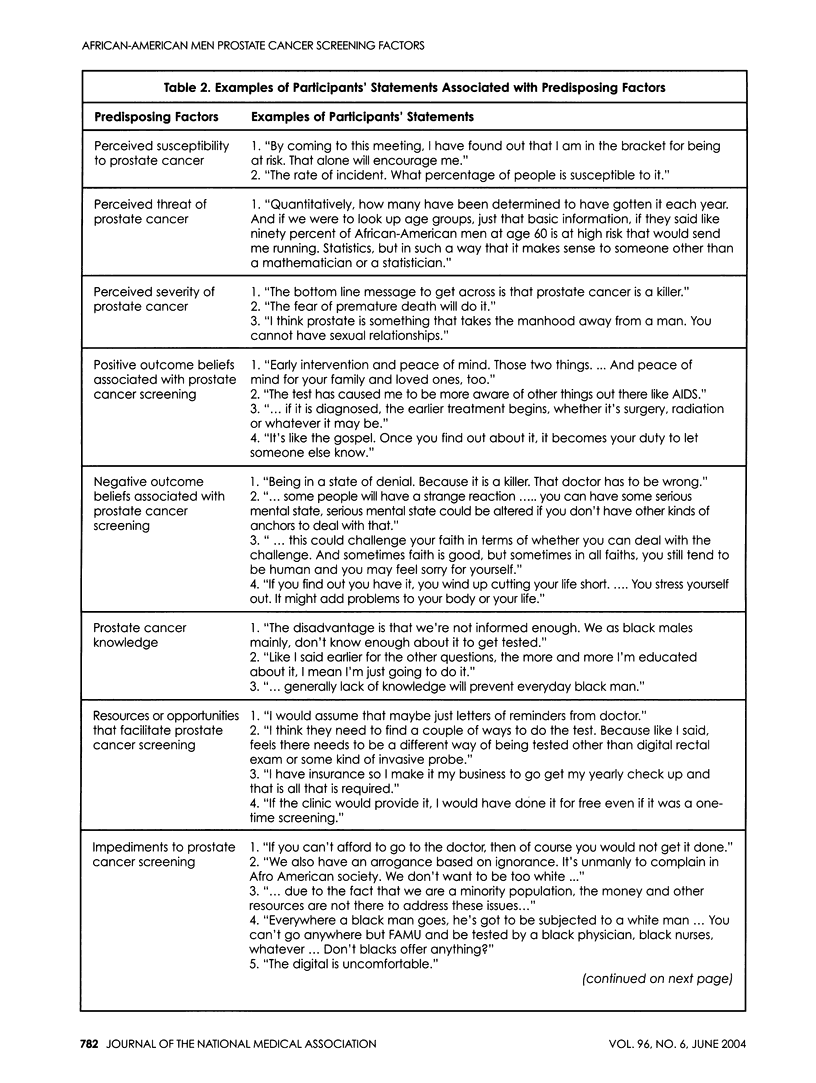
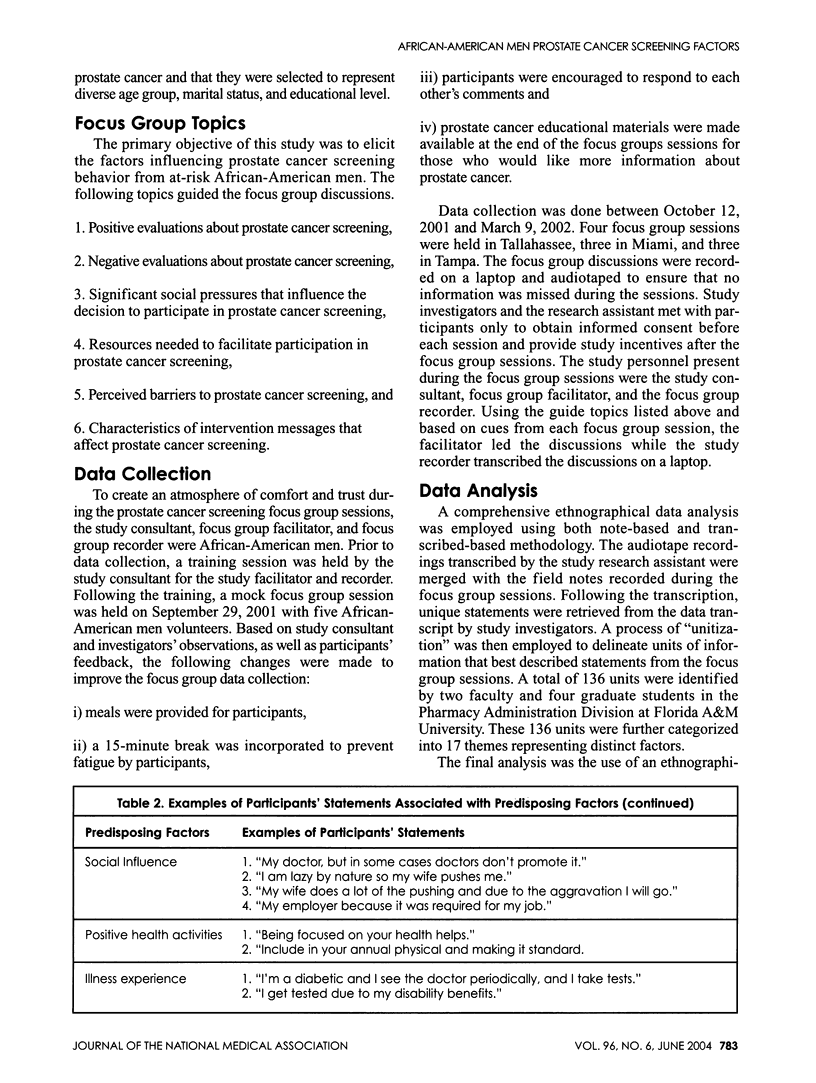
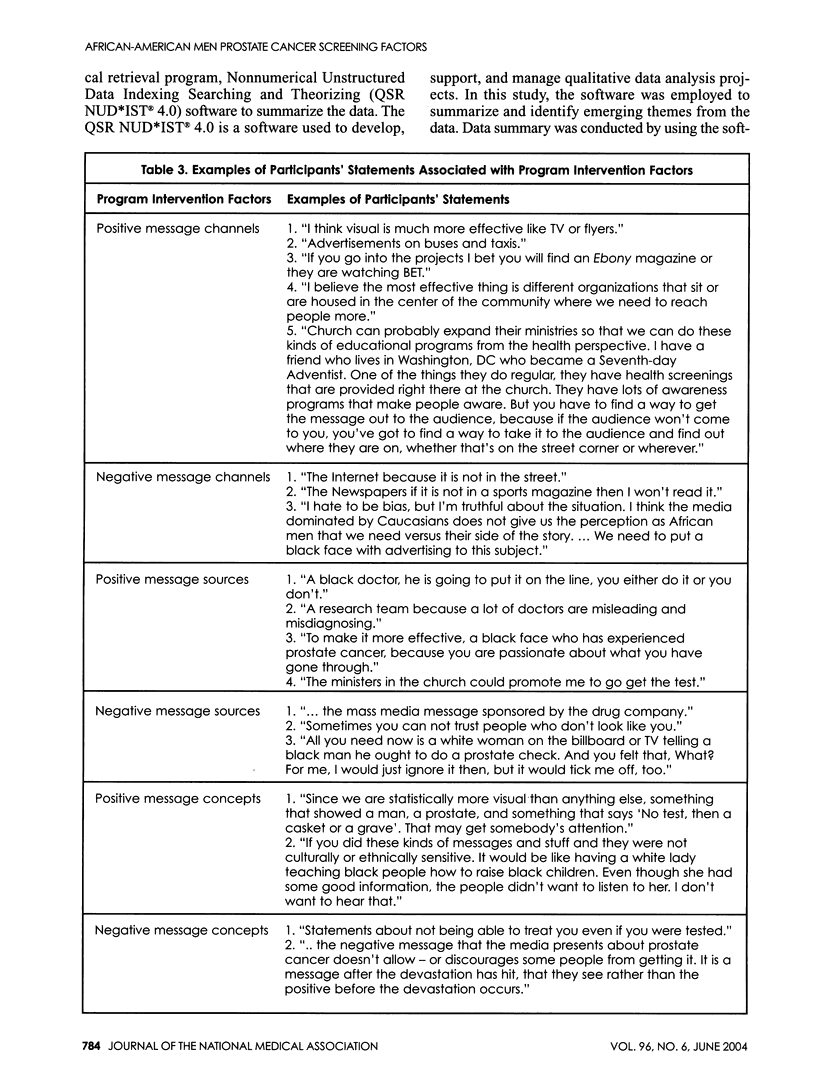
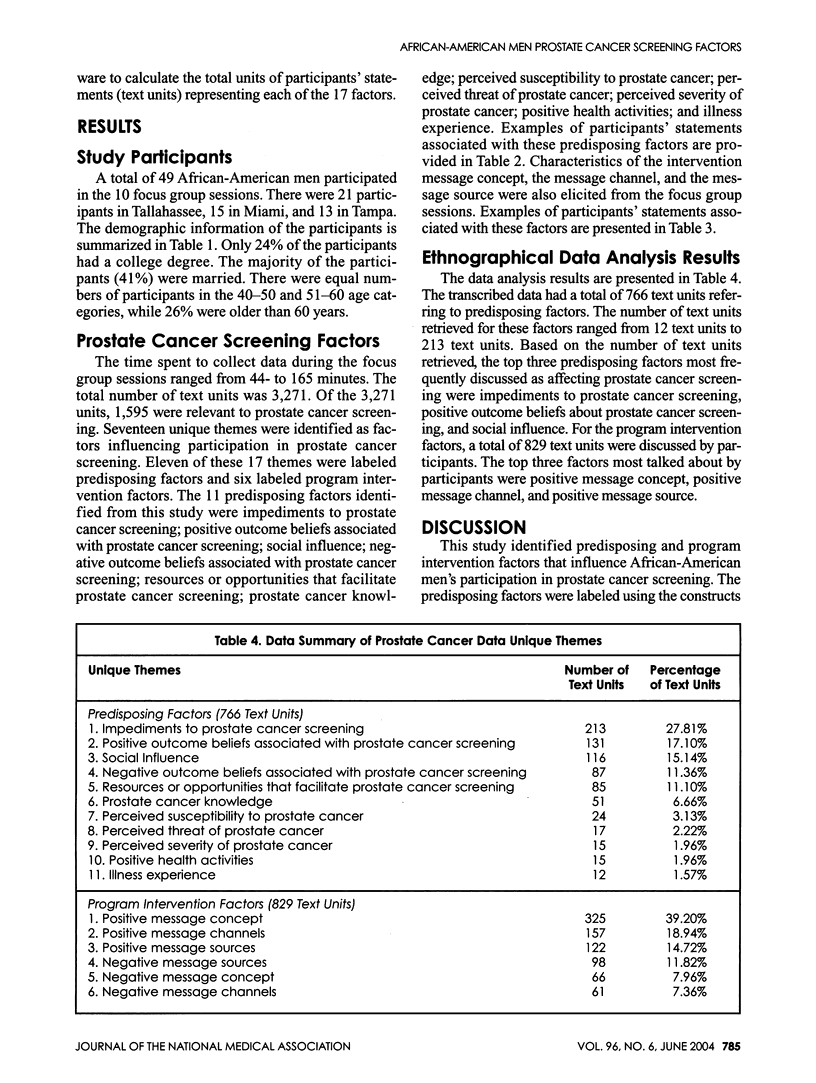
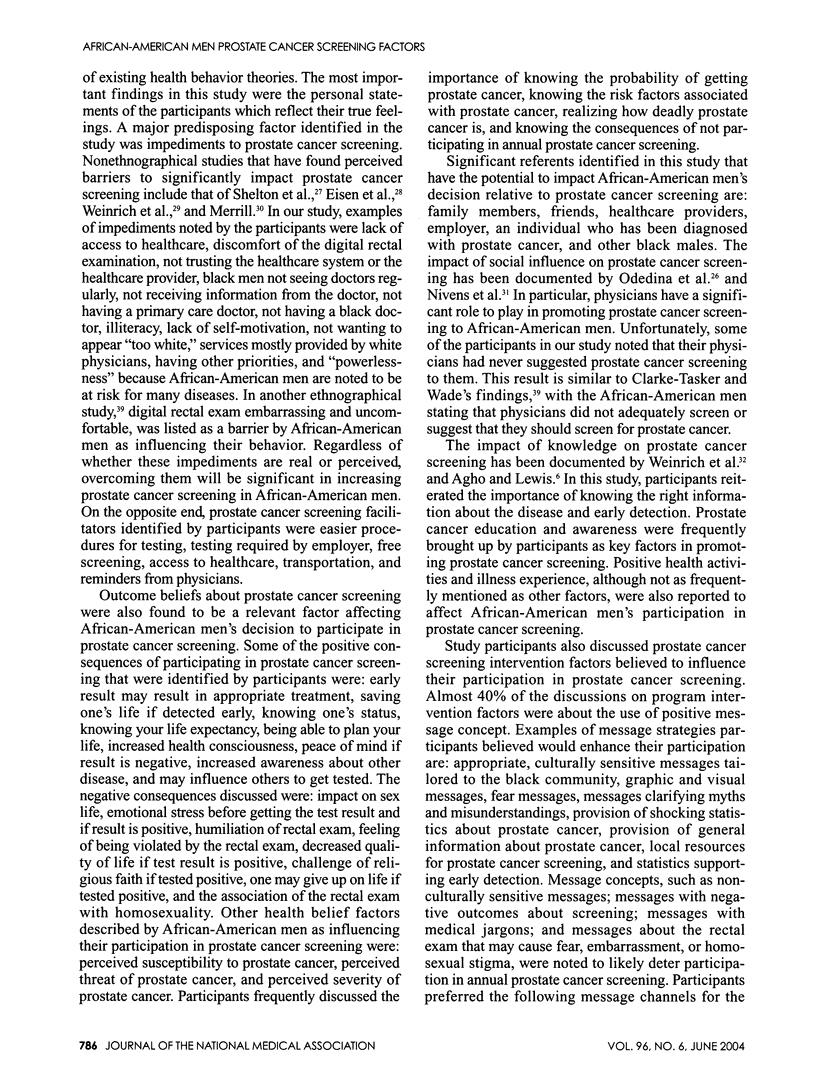
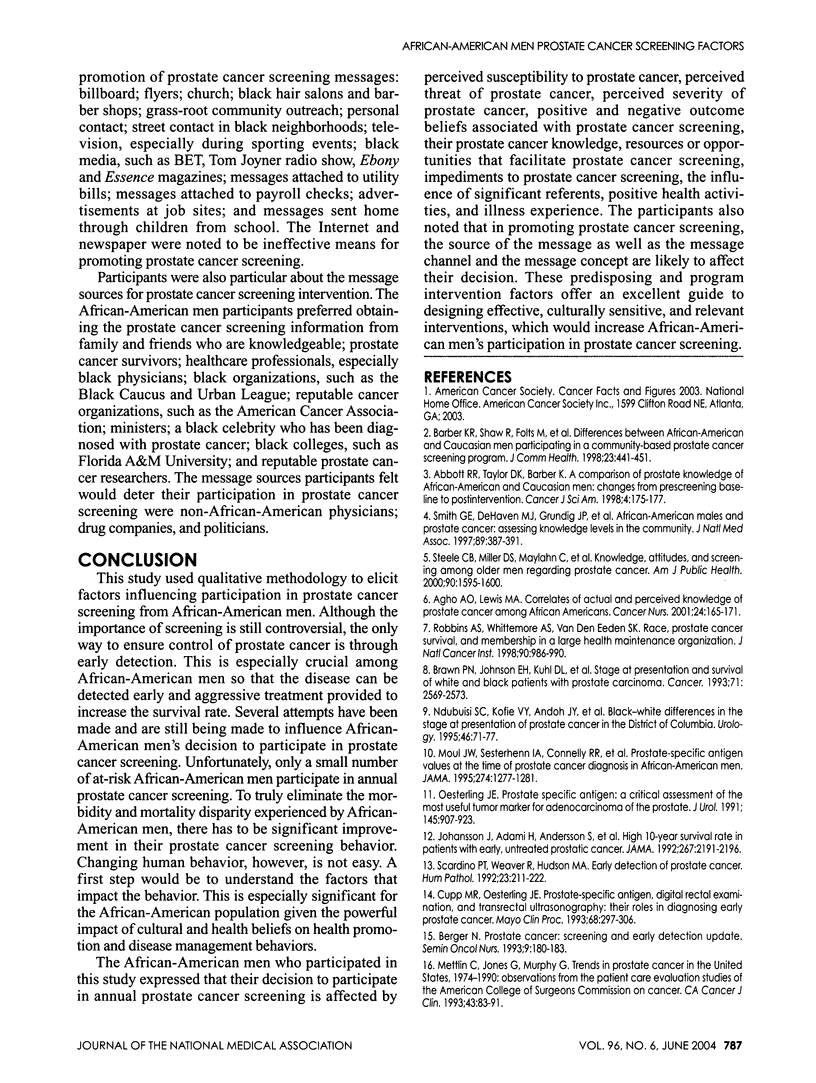
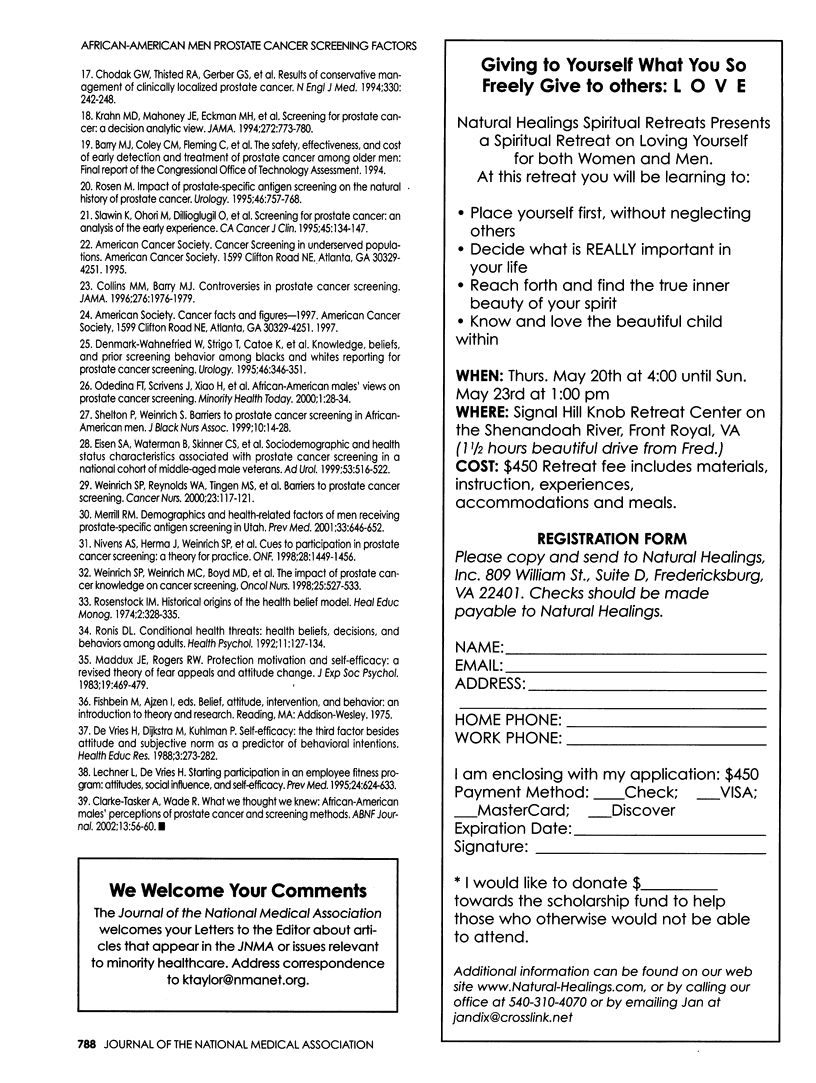
Selected References
These references are in PubMed. This may not be the complete list of references from this article.
- Abbott R. R., Taylor D. K., Barber K. A comparison of prostate knowledge of African-American and Caucasian men: changes from prescreening baseline to postintervention. Cancer J Sci Am. 1998 May-Jun;4(3):175–177. [PubMed] [Google Scholar]
- Agho A. O., Lewis M. A. Correlates of actual and perceived knowledge of prostate cancer among African Americans. Cancer Nurs. 2001 Jun;24(3):165–171. doi: 10.1097/00002820-200106000-00001. [DOI] [PubMed] [Google Scholar]
- Barber K. R., Shaw R., Folts M., Taylor D. K., Ryan A., Hughes M., Scott V., Abbott R. R. Differences between African American and Caucasian men participating in a community-based prostate cancer screening program. J Community Health. 1998 Dec;23(6):441–451. doi: 10.1023/a:1018758124614. [DOI] [PubMed] [Google Scholar]
- Berger N. S. Prostate cancer: screening and early detection update. Semin Oncol Nurs. 1993 Aug;9(3):180–183. doi: 10.1016/s0749-2081(05)80033-6. [DOI] [PubMed] [Google Scholar]
- Brawn P. N., Johnson E. H., Kuhl D. L., Riggs M. W., Speights V. O., Johnson C. F., 3rd, Pandya P. P., Lind M. L., Bell N. F. Stage at presentation and survival of white and black patients with prostate carcinoma. Cancer. 1993 Apr 15;71(8):2569–2573. doi: 10.1002/1097-0142(19930415)71:8<2569::aid-cncr2820710822>3.0.co;2-r. [DOI] [PubMed] [Google Scholar]
- Chodak G. W., Thisted R. A., Gerber G. S., Johansson J. E., Adolfsson J., Jones G. W., Chisholm G. D., Moskovitz B., Livne P. M., Warner J. Results of conservative management of clinically localized prostate cancer. N Engl J Med. 1994 Jan 27;330(4):242–248. doi: 10.1056/NEJM199401273300403. [DOI] [PubMed] [Google Scholar]
- Clarke-Tasker Veronica A., Wade Revia. What we thought we knew: African American males' perceptions of prostate cancer and screening methods. ABNF J. 2002 May-Jun;13(3):56–60. [PubMed] [Google Scholar]
- Collins M. M., Barry M. J. Controversies in prostate cancer screening. Analogies to the early lung cancer screening debate. JAMA. 1996 Dec 25;276(24):1976–1979. [PubMed] [Google Scholar]
- Cupp M. R., Oesterling J. E. Prostate-specific antigen, digital rectal examination, and transrectal ultrasonography: their roles in diagnosing early prostate cancer. Mayo Clin Proc. 1993 Mar;68(3):297–306. doi: 10.1016/s0025-6196(12)60052-4. [DOI] [PubMed] [Google Scholar]
- Demark-Wahnefried W., Strigo T., Catoe K., Conaway M., Brunetti M., Rimer B. K., Robertson C. N. Knowledge, beliefs, and prior screening behavior among blacks and whites reporting for prostate cancer screening. Urology. 1995 Sep;46(3):346–351. doi: 10.1016/S0090-4295(99)80218-0. [DOI] [PubMed] [Google Scholar]
- Eisen S. A., Waterman B., Skinner C. S., Scherrer J. F., Romeis J. C., Bucholz K., Heath A., Goldberg J., Lyons M. J., Tsuang M. T. Sociodemographic and health status characteristics with prostate cancer screening in a national cohort of middle-aged male veterans. Urology. 1999 Mar;53(3):516–522. doi: 10.1016/s0090-4295(98)00545-7. [DOI] [PubMed] [Google Scholar]
- Johansson J. E., Adami H. O., Andersson S. O., Bergström R., Holmberg L., Krusemo U. B. High 10-year survival rate in patients with early, untreated prostatic cancer. JAMA. 1992 Apr 22;267(16):2191–2196. [PubMed] [Google Scholar]
- Krahn M. D., Mahoney J. E., Eckman M. H., Trachtenberg J., Pauker S. G., Detsky A. S. Screening for prostate cancer. A decision analytic view. JAMA. 1994 Sep 14;272(10):773–780. [PubMed] [Google Scholar]
- Lechner L., De Vries H. Starting participation in an employee fitness program: attitudes, social influence, and self-efficacy. Prev Med. 1995 Nov;24(6):627–633. doi: 10.1006/pmed.1995.1098. [DOI] [PubMed] [Google Scholar]
- Merrill R. M. Demographics and health-related factors of men receiving prostate-specific antigen screening in Utah. Prev Med. 2001 Dec;33(6):646–652. doi: 10.1006/pmed.2001.0940. [DOI] [PubMed] [Google Scholar]
- Mettlin C., Jones G. W., Murphy G. P. Trends in prostate cancer care in the United States, 1974-1990: observations from the patient care evaluation studies of the American College of Surgeons Commission on Cancer. CA Cancer J Clin. 1993 Mar-Apr;43(2):83–91. doi: 10.3322/canjclin.43.2.83. [DOI] [PubMed] [Google Scholar]
- Moul J. W., Sesterhenn I. A., Connelly R. R., Douglas T., Srivastava S., Mostofi F. K., McLeod D. G. Prostate-specific antigen values at the time of prostate cancer diagnosis in African-American men. JAMA. 1995 Oct 25;274(16):1277–1281. [PubMed] [Google Scholar]
- Ndubuisi S. C., Kofie V. Y., Andoh J. Y., Schwartz E. M. Black-white differences in the stage at presentation of prostate cancer in the District of Columbia. Urology. 1995 Jul;46(1):71–77. doi: 10.1016/S0090-4295(99)80162-9. [DOI] [PubMed] [Google Scholar]
- Nivens A. S., Herman J., Pweinrich S., Weinrich M. C. Cues to participation in prostate cancer screening: a theory for practice. Oncol Nurs Forum. 2001 Oct;28(9):1449–1456. [PubMed] [Google Scholar]
- Oesterling J. E. Prostate specific antigen: a critical assessment of the most useful tumor marker for adenocarcinoma of the prostate. J Urol. 1991 May;145(5):907–923. doi: 10.1016/s0022-5347(17)38491-4. [DOI] [PubMed] [Google Scholar]
- Robbins A. S., Whittemore A. S., Van Den Eeden S. K. Race, prostate cancer survival, and membership in a large health maintenance organization. J Natl Cancer Inst. 1998 Jul 1;90(13):986–990. doi: 10.1093/jnci/90.13.986. [DOI] [PubMed] [Google Scholar]
- Ronis D. L. Conditional health threats: health beliefs, decisions, and behaviors among adults. Health Psychol. 1992;11(2):127–134. doi: 10.1037//0278-6133.11.2.127. [DOI] [PubMed] [Google Scholar]
- Rosen M. A. Impact of prostate-specific antigen screening on the natural history of prostate cancer. Urology. 1995 Dec;46(6):757–768. doi: 10.1016/S0090-4295(99)80339-2. [DOI] [PubMed] [Google Scholar]
- Scardino P. T., Weaver R., Hudson M. A. Early detection of prostate cancer. Hum Pathol. 1992 Mar;23(3):211–222. doi: 10.1016/0046-8177(92)90102-9. [DOI] [PubMed] [Google Scholar]
- Shelton P., Weinrich S., Reynolds W. A., Jr Barriers to prostate cancer screening in African American men. J Natl Black Nurses Assoc. 1999 Fall-Winter;10(2):14–28. [PubMed] [Google Scholar]
- Slawin K. M., Ohori M., Dillioglugil O., Scardino P. T. Screening for prostate cancer: an analysis of the early experience. CA Cancer J Clin. 1995 May-Jun;45(3):134–147. doi: 10.3322/canjclin.45.3.134. [DOI] [PubMed] [Google Scholar]
- Smith G. E., DeHaven M. J., Grundig J. P., Wilson G. R. African-American males and prostate cancer: assessing knowledge levels in the community. J Natl Med Assoc. 1997 Jun;89(6):387–391. [PMC free article] [PubMed] [Google Scholar]
- Weinrich S. P., Reynolds W. A., Jr, Tingen M. S., Starr C. R. Barriers to prostate cancer screening. Cancer Nurs. 2000 Apr;23(2):117–121. doi: 10.1097/00002820-200004000-00007. [DOI] [PubMed] [Google Scholar]
- Weinrich S. P., Weinrich M. C., Boyd M. D., Atkinson C. The impact of prostate cancer knowledge on cancer screening. Oncol Nurs Forum. 1998 Apr;25(3):527–534. [PubMed] [Google Scholar]


